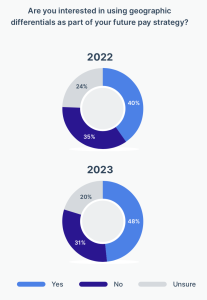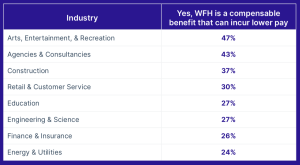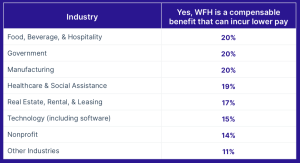HR professionals will all know that one of the most frustrating aspects about working with people is that they’re actually notoriously fickle.
And there’s no better example of this than when it comes to what employees often say about pay versus the reality of this.
Survey after survey suggests employees would happily give up part of their salary if they were given more flexibility or able to work the hours they wanted.
For example, a 2021 poll of 3,500 workers by GoodHire found 61% would be willing to take a pay cut in exchange working flexibly.
When asked how much pay they’d give up, research by Joblist has revealed US employees would sacrifice between 2.6% and 5.1% of their salary for more flexibility. Parents would sacrifice the most at 5.1%, but even millennials said they would forego 3.9% of the pay.
So far, so predictable.
But there’s a phrase in life – ‘be careful of what you wish for.’
Because recently, firms have been calling this bluff.
Many are either considering, or have already introduced, some form of variable pay strategy based on where people work.
In theory, variable pay satisfies exactly what employees said they wanted, while for employers it’s a cost-saving win-win.
Philosophically, it makes sense too. If staff want the ease and comfort of staying at home to work, and aren’t spending their time and money commuting to the office, then they don’t need to be compensated for the stress and expense this entails.
Not surprisingly, last year 40% of organizations said they’re considering a location-based pay structure according to Payscale’s 2022 Compensation Best Practices report, and this year this is expected to rise to 48% (see below):




Of course, employees are fickle, because while they might said this is what they wanted this, the reality is a much different picture.
In the cold light of day, expecting employees to take a pay cut for doing the same amount of work will be a tough pill for them to swallow.
When firms like Alphabet, Amazon, Apple, Meta and Microsoft announced they would slash the pay of those relocating outside Silicon Valley (justifying it on the basis that existing wages were pegged to high living costs in the San Francisco Bay Area), it created a huge big backlash.
Opponents argue pay shouldn’t be linked to location, or whether someone chooses to work remotely, because all employees doing similar jobs should receive the same wage regardless.
But with cost pressures impacting businesses, offering location-based pay is an enticing one for HRDs.
So what options are there for HRDs to be able to push this policy through without a fight (or less of a fight)?
To debate some of these issues, TLNT spoke to Ian White, CEO of people operations platform, ChartHop:
Q: Set the scene for us; why is location-based pay so high up on the agenda right now?
A “While there’s always been some form of pay differential – typically based on the cost of living in big cities – the pandemic has really thrust the concept of variable pay higher up the agenda because organisations are looking at pay and value and whether a city-weighted pay package applies if people aren’t there in the office anymore. At the same time, people have also – over time – become much less secretive about pay. Given there are comparison websites where staff can see what they’re paid relative to their colleagues, many workers are much more willing to share/discuss what they earn. So there’s been a parallel issue of pay transparency also in the background.”
Q: Are people already finding out they’re being paid differently based on ‘where’ they work?
A: “Yes, absolutely. Now that pay information is readily out there, people are asking ‘what is going on?’, and they’re demoralized. Where pay transparency starts getting complicated however, is if people aren’t commuting and are paid less because of it, even though their ‘value’ of output is the same. It creates a question mark about whether HRDs feel it’s right to pay someone less for producing the same value of output as someone else, just because they work remotely.”
Q: Can variable/location-based pay exist in a world that demands pay transparency?
A: “The answer here is actually yes. Transparent pay isn’t equal pay. It’s different. Pay differences are fine, but they have to be justified – that’s the transparency bit of it. For instance, pay differences are acceptable if a person has more skills; their role is in more demand, or they have more experience. It’s the justification of the difference that matters. Justification – and whether it’s accepted by people – impacts workers’ basic sense of fairness. Data actually finds that people can live with knowing people get paid more than them, as long as it’s explained why. There is even research that shows people work harder when they find out what their boss earns, because it incentivizes them to get promoted.”
Q: So what do HRDs need to do if they want to introduce pay variances?
A: First they need to take a job-leveling approach – that is every role needs a framework of skills/competencies – rather than a pay-band approach. The latter just focuses on pay, while a job leveling approach sets out what’s different from, say a L3 engineer to a L4 engineer. This approach will typically identify a cohort that has been historically under-paid, and these people’s pay should be corrected immediately. It’s from here that HRDs can then consider the extent to which where people work impacts salaries.”
Q What should then happen next?
A: “Establishing job roles is the bare minimum. The real work then begins with communicating the compensation strategy and how it can be shown to be fair, including even explaining how people can make more money. It’s easy for HR to come up with complex pay strategies, but managers are often left unable to explain them to their troops. A proper pay policy eliminates the ‘I would pay you more, but my boss won’t let me…’ line that I often hear managers use. They do this to try and deflect pay conversations away from them being their responsibility.”
Q: But will any of this help make talking about pay reductions easier for those who choose to work remotely?
A: “No one likes knowing they’re being paid less others, and communicating this to remote workers will be a challenge. But it’s not necessarily an ‘unfair’ thing for HRDs or remuneration specialists to bring up. HR should be explaining that those workers who prefer working from home do actually ‘gain’ by doing so. What HR professionals need to be confident about, is that while it’s not always easy revising pay down, nor is it an unfair thing to do either. When you ask people about what makes people really stressed or unhappy, it’s normally always the commute that workers hate. If people work remote, they’re benefiting from taking out the worst part of their day.”
Q: What do you think the future outlook is?
A “I do genuinely think we will see more companies paying less for remote-first workers. People talk about the risk this may pose in terms of losing good talent, but my view is that there will simply emerge two cohorts of people: those who prefer the office (and will be attracted by that proposition), and those who prefer to work remotely. That’s just how I see things panning out. I don’t actually think trying to create the best of both worlds – ie hybrid – works. I think companies that try and navigate the hybrid model will be less successful. For me, I think it needs to be just one or the other. Hybrid is just messy.”
Q: So…final question, do people ‘really’ want to give up their pay for more flexibility/working remotely?
A: “I think it’s a debate that’s still being worked through. Lots of the surveys that gave good headlines about the extent to which people would take a pay cut, were done before Covid-19, when working from home was a rarity. I think what’s complicated things, is that working from home used to be seen as a ‘perk’, and so it was something people would give up part of their salary to get. Now though, working remote is just seen as normal, so the question this creates is should people give up some of their pay to achieve what is now regarded as a ‘normal’ way of working. This is why I think the debate is still ongoing. It will be interesting to see how it pans out.”
